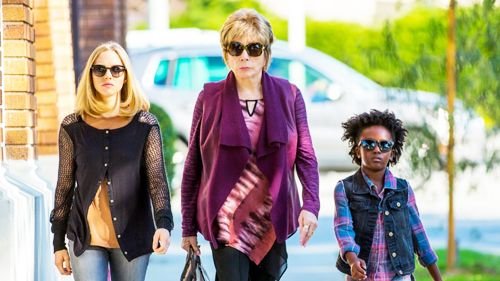
MacLaine’s “Last Word” as a curmudgeon offers some unexpected moments
Harriet (Shirley MacLaine) is not a happy soul. She lives alone in a house that exudes wealth and boredom. She is snobby to her staff, always knowing better than them and everyone else for that matter. A half-hearted suicide attempt lands her in the hospital briefly where she dismisses the doctor’s advice and heads back to her solitude.
As Harriet skims the paper that next night, she notices an homage to a “beloved teacher” who has died “surrounded by her loved ones,” written by obit writer Anne (Amanda Seyfried). Harriet decides she needs a legacy before she passes, her “Last Word,” if you will, the title of the film directed by Mark Pellington.
She heads to the newspaper offices and confronts Ann, dismissing her recent obits as flat out lies. Recently deceased Louis Shenken was “a bitch” and Eugene Baker sang all the time because he was “a drunk,” but Ann’s obits make them look magnificent.
Harriet browbeats Ann into working for her so she’ll get her own brilliant write-up. She wants the four elements of a good obit: a great headline, loved by family, admired by co-workers, and having touched someone’s life unexpectedly (preferably a “minority” or “a cripple” - her words).
Predictably, none of these elements exist as Ann does her research, but Harriet won’t go away quietly, and when Harriet goes to a center for at-risk kids and picks out precocious and somewhat vulgar Brenda (AnnJewell Lee Dixon) as her do-gooder project, Brenda quips that she must be doing community service for drunk driving like other white folks who show up there.
What was unexpected is Harriet’s love of vinyl and her ability to talk herself into a DJ job. That foray gives this film distinction and broadens the stereotypes.
Of course, the ice thaws between Brenda, Ann and Harriet and this motley crew goes on a road trip, complete with a not-so-nice luncheon with Harriet’s estranged daughter (Anne Heche) and a hike in the night woods complete with a jump in a lake (sort of). In the end this buddy film leaves the viewer with a warm and fuzzy glow.
Says director Pellington about Harriet: “She’s showing Anne and Brenda—and herself—what kind of life that she wants to lead,” notes Pellington. “She is encouraging them to figure that out for themselves. Open yourself up. Don’t be afraid to fail. … She takes what could be sentimental, greeting-card life lessons and makes them completely human and grounded.”
What stands out to me about veteran actor MacLaine is how nuanced her acting is: just a slight lift of an eyebrow, turn of the corner of her mouth, a shift in her posture speaks volumes. While I love her earlier films much more (especially “The Apartment” (1960) and “Terms of Endearment” (1980)) - I’m always happy to see her still shining brightly. More films are in the works according to IMDb. Here’s a link to the trailer:
Sources: IMDb, the film itself, http://www.bleeckerstreetmedia.com/editorial/women-united